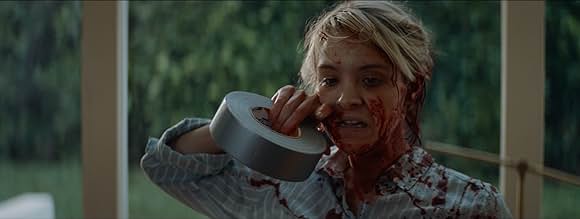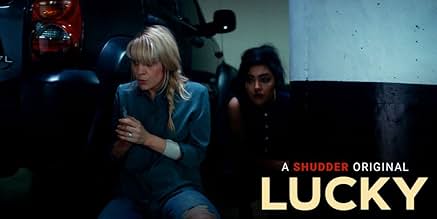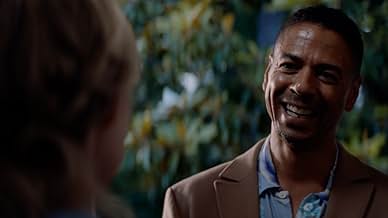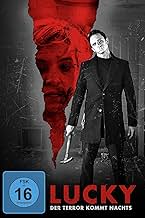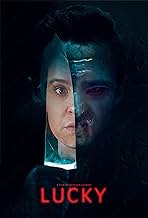A suburban woman fights to be believed as she finds herself stalked by a threatening figure who returns to her house night after night. When she can't get help from those around her, she is ... Read allA suburban woman fights to be believed as she finds herself stalked by a threatening figure who returns to her house night after night. When she can't get help from those around her, she is forced to take matters into her own hands.A suburban woman fights to be believed as she finds herself stalked by a threatening figure who returns to her house night after night. When she can't get help from those around her, she is forced to take matters into her own hands.
- Awards
- 1 nomination total
Leith M. Burke
- Rob
- (as Leith Burke)
Nikea Gamby-Turner
- Detective
- (as Nikea Gamby Turner)
- Director
- Writer
- All cast & crew
- Production, box office & more at IMDbPro
Featured reviews
Writer and protagonist Grant has something to say about violence against women-- something to say about the ways that some women are hobbled by fear of violence. Unfortunately, what Grant has to say is not clear.
Is Lucky a study on the meaningless surreality of some of these fears, that their focus is on some masked stranger in a parking garage rather than on one's husband, the vastly more likely source of violence? Or is Lucky instead arguing that those masked strangers are inappropriately disregarded as a legitimate source of fear? Does Lucky argue that women need to stick together to escape their chains? Or does it instead tell us that women should "Go It Alone" because solidarity is hopeless? When Grant angrily insists that her success is 100% a function of her hard work, are we as the audience supposed to be cheering for her self-regard or shaking our heads at her self-importance? Are we invited to think that all men (save our husbands, of course) are responsible for our fear, or are we instead asked if we're failing to see "Schrodinger's Rapist" as something other than an object-- a man with a face, many men with many faces?
Maybe Grant isn't sure about any of that, and Lucky is just asking a lot of questions. Maybe it's less of a manifesto, more of a meditation. But if so, even that uncertainty is unclear. Lucky merely allows us to be reminded of our own questions-- or of our own certainty regarding the answers-- and if we have none, then Lucky doesn't do anything to change that.
That might be okay sometimes. Like Inglorious Basterds, Lucky seems to be fine with you ignoring the critical questions. In Lucky's case, in favor of just watching a poppy, PG-13 thriller. Unfortunately, Lucky doesn't travel the traditional scales of pop. It is a thought experiment, with little relationship to reality, yet never embraces this, never surprises us with any genuine weirdness. Any transformation here is transient-- abandoned in the third act. And there is no reveal, no catharsis; the unmasking has no impact on the movie as a work of entertainment. There is no denouement. The plot questions are never answered.
But it's not poorly made: the acting is generally decent (although there are occasional awkward missteps); it's not overly long; the production values are good. Lucky may not hit the targets it aimed for, but it's an acceptable way to blow an hour and a half.
Is Lucky a study on the meaningless surreality of some of these fears, that their focus is on some masked stranger in a parking garage rather than on one's husband, the vastly more likely source of violence? Or is Lucky instead arguing that those masked strangers are inappropriately disregarded as a legitimate source of fear? Does Lucky argue that women need to stick together to escape their chains? Or does it instead tell us that women should "Go It Alone" because solidarity is hopeless? When Grant angrily insists that her success is 100% a function of her hard work, are we as the audience supposed to be cheering for her self-regard or shaking our heads at her self-importance? Are we invited to think that all men (save our husbands, of course) are responsible for our fear, or are we instead asked if we're failing to see "Schrodinger's Rapist" as something other than an object-- a man with a face, many men with many faces?
Maybe Grant isn't sure about any of that, and Lucky is just asking a lot of questions. Maybe it's less of a manifesto, more of a meditation. But if so, even that uncertainty is unclear. Lucky merely allows us to be reminded of our own questions-- or of our own certainty regarding the answers-- and if we have none, then Lucky doesn't do anything to change that.
That might be okay sometimes. Like Inglorious Basterds, Lucky seems to be fine with you ignoring the critical questions. In Lucky's case, in favor of just watching a poppy, PG-13 thriller. Unfortunately, Lucky doesn't travel the traditional scales of pop. It is a thought experiment, with little relationship to reality, yet never embraces this, never surprises us with any genuine weirdness. Any transformation here is transient-- abandoned in the third act. And there is no reveal, no catharsis; the unmasking has no impact on the movie as a work of entertainment. There is no denouement. The plot questions are never answered.
But it's not poorly made: the acting is generally decent (although there are occasional awkward missteps); it's not overly long; the production values are good. Lucky may not hit the targets it aimed for, but it's an acceptable way to blow an hour and a half.
The killer mask is cheap. It has little horror effective elements. It is more psychological drama than horror movie. The cool mystery about the loop quickly disappeared. It was hard to care for the main character. I liked the first 20 minutes, and the last 20 minutes because there was finaly some progress. Didn't like the generalisation it gives about men. If you liked the 2019 version of Black Christmas, may be this one is for you.
I appreciate directors and writers who try to do things a little differently to the constant identical horror movies we see everyday. And I like the fact we get presented with movies that aren't as straightforward as others. This movies reminds me of Mother! While I like the ideas behind the movies and trying to get people to think outside the box, the execution of these films needs to be a little tidier. They start off really interesting and as a viewer, you're really intrigued and excited....and then they just go to a weird place and don't come back, and you're sitting there thinking...'huh?'
There were several plot holes in this film and many things that were introduced were not explained at all. Not everyone who watched will be able to deduce certain clues brought up. It doesn't need to be a blatant in your face explanation that takes away from the mystery of the film, but it does need to be addressed in a way the viewer is like, 'ah, ok...I see what they did there.' It felt unfinished at 1hr 20mins. Could have packed a bit more in to wrap things up.
There were several plot holes in this film and many things that were introduced were not explained at all. Not everyone who watched will be able to deduce certain clues brought up. It doesn't need to be a blatant in your face explanation that takes away from the mystery of the film, but it does need to be addressed in a way the viewer is like, 'ah, ok...I see what they did there.' It felt unfinished at 1hr 20mins. Could have packed a bit more in to wrap things up.
Although this is billed as a thriller/horror film, I'd place it more in the category of Black Mirror or Twilight Zone in that it's a satire about the state of things in the world, told with surreal/absurd elements. For example there were themes of people being disbelieved, while holding to an every-person-for-themselves attitude, further preventing people from getting support. There's much more to it than that (gender and class) so I'm summarizing very briefly.
Other points: Some of the acting was stiff at times but that became an advantage during brief kafkaesque scenes of the protagonist attempting to communicate. With surreal elements, it often comes with the territory in any case. The music was minimal and rather than announcing everything that was about to happen, it left space for the imagination to fill in the blanks, only containing a few themes that repeated, along with a few key visual leitmotifs.
I can see how a person following this as a literal story with a straightforward protagonist might expect things to go differently, but I felt a definite tension leading up to the end, wondering how the director would play out the themes presented in the story. Perhaps intentionally on the part of the director, while I felt sympathy for the main character, I felt even more for a few of the side characters, especially toward the end of the movie.
Overall I enjoyed the movie, found the themes timely, and will look up other movies by this director.
Other points: Some of the acting was stiff at times but that became an advantage during brief kafkaesque scenes of the protagonist attempting to communicate. With surreal elements, it often comes with the territory in any case. The music was minimal and rather than announcing everything that was about to happen, it left space for the imagination to fill in the blanks, only containing a few themes that repeated, along with a few key visual leitmotifs.
I can see how a person following this as a literal story with a straightforward protagonist might expect things to go differently, but I felt a definite tension leading up to the end, wondering how the director would play out the themes presented in the story. Perhaps intentionally on the part of the director, while I felt sympathy for the main character, I felt even more for a few of the side characters, especially toward the end of the movie.
Overall I enjoyed the movie, found the themes timely, and will look up other movies by this director.
1. Poor or non-existent forensics reduced the credibility of the story.
2. Like a poor teacher the storyline does not direct the audience into thinking about the issue of fear, but instead has us asking what's going on. The focus was on knives, hammers, blood on floor, bodies gone.
3. Bodies disappearing opens many interpretations some of which are nonsensical which added to the confusion. Was she hallucinating; a metaphor; ghosts/spirits?
4. The poor response to securing the home & ways of protecting one's self gives us another female victim character as helpless & lacking intelligence.
5. Even the DVDs special feature of production staff audio commentary overlay said nothing about the story itself, but only camera angles, lighting, etc.
2. Like a poor teacher the storyline does not direct the audience into thinking about the issue of fear, but instead has us asking what's going on. The focus was on knives, hammers, blood on floor, bodies gone.
3. Bodies disappearing opens many interpretations some of which are nonsensical which added to the confusion. Was she hallucinating; a metaphor; ghosts/spirits?
4. The poor response to securing the home & ways of protecting one's self gives us another female victim character as helpless & lacking intelligence.
5. Even the DVDs special feature of production staff audio commentary overlay said nothing about the story itself, but only camera angles, lighting, etc.
Did you know
- GoofsAt 19:32, when May is talking to Ted's sister Sarah, her iPhone isn't compatible with the case she's using.
- ConnectionsFeatured in Dead Meat Podcast: Interview with Brea Grant (2021)
- SoundtracksSign of the Times
Written by Hannah Fairlight
Produced by Michael Wagener
Performed by Hannah Fairlight
- How long is Lucky?Powered by Alexa
Details
- Release date
- Country of origin
- Official site
- Language
- Also known as
- Şanslı
- Production company
- See more company credits at IMDbPro
- Runtime1 hour 23 minutes
- Color
- Aspect ratio
- 2.39 : 1
Contribute to this page
Suggest an edit or add missing content



